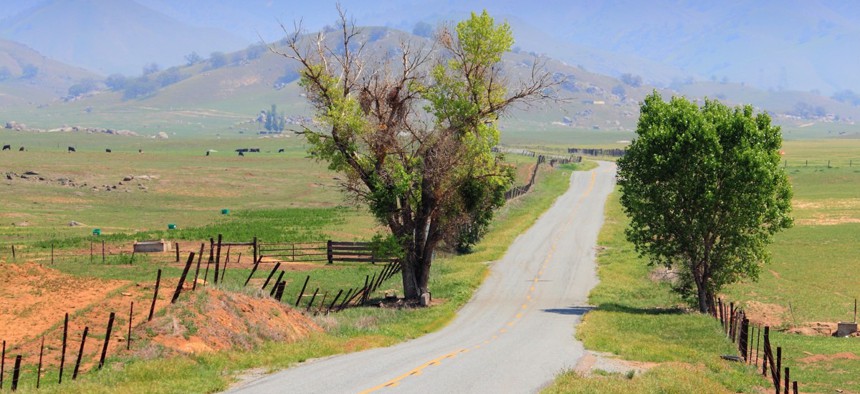Help for California Towns With Dry Wells; Making America More Dementia Friendly Now

Tulare County, California Tupungato / Shutterstock.com
Also: Hoping to end the gerrymander in Ohio and working to turnaround the criminal justice disaster in Maryland
Here’s some of what we’ve been reading today…
TULARE COUNTY, California: Nearly 1,900 water wells have failed so far this year in the Tulare County area of the Golden State’s heavily agricultural Central Valley, reports the Visalia Times-Delta. Well die-offs are clustering around towns like Porterville, Cutler and Orosi. Emergency services in the area are tracking drought-related activity. It’s not pretty. Some 1,300 households have qualified for a bottled water program. There have been 2,300 calls for assistance to local United Way tied to the drought. An organization called FoodLink has distributed 180,000 food relief packages. This week, the county is rigging up a helicopter with mapping/measuring technology to assess the state of local aquifers.
The Visalia Times-Delta story is part of a series the newspaper is doing on the drought. Stories in the series include, “Drought Shaming: The new class warfare” and “Drought app lets you tattle-tale on water wasters.”
Related: The Sacramento Bee reports that insurance-based estimates are in on the damage done by the Valley and Butte fires that raged through Northern California in September. Aon Benfield insurance company puts the cost at $2 billion, ranking the fires among the most costly in state history. About $800 million in loss will not be covered. [The Visalia Times-Delta, The Sacramento Bee]
CAMBRIDGE, Minnesota: Local programs tied to the national Dementia Friendly America project are beginning to go into effect around the country, reports Stat, a Boston Globe Media Partners health policy publication. For now, programs tied to the project are test programs, paid for with state tax money and grants, in which emergency responders, police officers, bank tellers, caregivers, road-sign makers, and others prepare with experts to better handle the growing population of residents who struggle with dementia. Estimates put the number of Americans with Alzheimer’s at 5.3 million. By 2050, that number will reach an estimated 16 million. Supporters compare the Dementia Friendly America project to the effort 25 years ago to rethink and accommodate for physically disabled Americans. Current project grants for local communities are available through the Alzheimer’s Association, AARP, CVS Caremark and the National League of Cities. [STAT via The Boston Globe]
COLUMBUS, Ohio: Voters in the Buckeye State have the chance to remake the way political districts are drawn in the state. The Cincinnati Enquirer reports that ballot Issue 1 is drawing attention from voting analysts around the nation. Under the plan, legislative and congressional districts would be drawn by a bipartisan panel according to rules that would make them much more competitive.
According to the Enquirer:
Panel members would have to avoid splitting up neighborhoods and cities, prioritize compact districts, allow citizens to weigh in on the maps through public hearings and base their lines on who shows up to the polls. That last piece makes voter turnout much more important… Even if Debbie Democrat lives in a heavily Republican area, her vote would help determine how Democratic the district will be in the future. Her candidate might lose now, but she could help another one win later.
The proposal was drafted by term limited lawmakers on the right and left. "I want to be a member of a party that wins elections because we have the right ideas," said Sen. Frank LaRose, R-Copley. “I don’t want to be a member of the party that wins because they rig the game." [The Cincinnati Enquirer]
ANNAPOLIS, Maryland: Annapolis lawmakers are ready for change. They are working to end what has been a slow-motion criminal justice disaster in the state, reports The Baltimore Sun, where ever more residents are serving longer sentences for even non-violent crimes, forcing the state to pay more to build more prisons without seeming to make the state any safer. Maryland will spend $768 million this year to keep about 21,000 people in prison. Since June, lawmakers on the right and left have joined what they call the Justice Reinvestment Coordinating Council. Members have met with police, judges, prosecutors, public defenders, and others in the criminal justice system. “The idea isn't necessarily to save money,” writes The Sun, “but to spend it more wisely. Instead of building more prisons, some believe public safety would improve if money were shifted to drug treatment, mental health care and a more robust parole and probation system.” [The Baltimore Sun]
DESERET RANCH, Florida: The Mormon Church owns a tract of pasture land outside of Orlando that is six times the size of Manhattan, and they aim to transform the sprawling home to cows and alligators into cul de sacs and suburban housing. The plan would “radically reshape” Osceola County, reports The Tampa Bay Times, moving out cowboys to make way for Puerto Rican immigrant families. Opponents of the plan say it would ruin habitat near the headwaters of the St. Johns and the Kissimmee rivers and that the process has lacked sufficient oversight. They say county commissioners are in thrall to the wealthy Deseret Ranch owners. Supporters say long-term planned development is better than the willy-nilly building sure to come anyway over the next few decades. They say it’s better to develop east in the area rather than south into the Everglades. It’s the largest proposed development project in state history. [The Tampa Bay Times]
John Tomasic is a journalist who lives in Boulder, Colorado.
NEXT STORY: Substance Use Disorder and the Role of States





